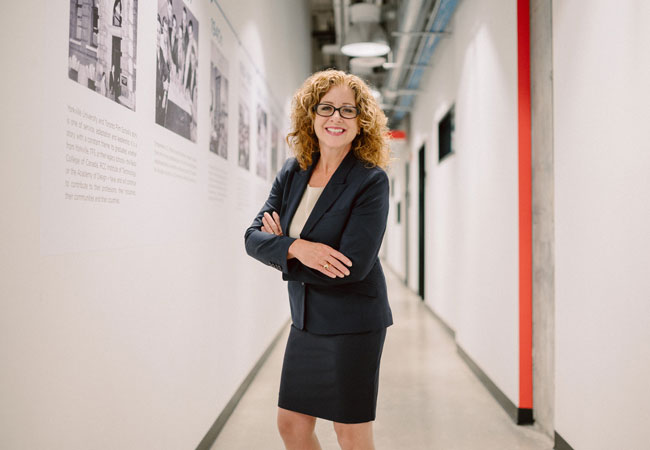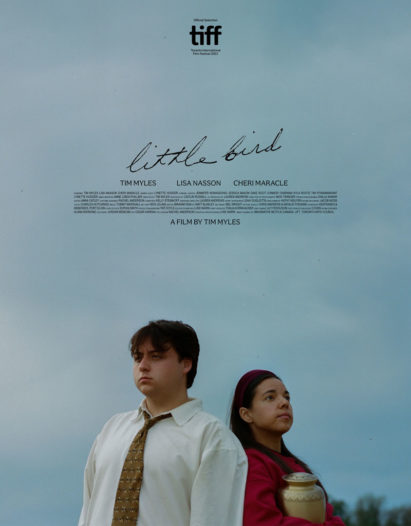TFS Staff and Faculty Honour Truth & Reconciliation with Day of Reflection
In This Article
Toronto Film School will honour Canada’s first-ever National Day for Truth and Reconciliation by providing its faculty and staff with the day off to reflect.
“Sept. 30, 2021 is a day that the federal government announced as National Day for Truth and Reconciliation, and we decided that, as a sign of respect and our deep commitment to reconciliation, we wanted to provide all of our employees with the day off,” Dr. Julia Christensen Hughes, president of TFS’s affiliate school, Yorkville University, said in a recent Town Hall event.

“It’s not just a day off, but, more importantly, a day to reflect on the hard work that needs to be done to build meaningful relationships with Indigenous communities and members of our own community.”
Federally designated as a statutory holiday this past June, National Day for Truth and Reconciliation seeks to honour First Nations, Inuit and Métis survivors of residential schools, as well as their families and communities, ensuring that public commemoration of their history and the legacy of residential schools remains a vital component of the reconciliation process.
With those goals in mind, Toronto Film School has curated a number of enlightening events – both past and present – for faculty, staff, and students to tune into, as well as a list of resources the entire school community is encouraged to access on Sept. 30.

Firstly, Toronto Film School will host a special screening of Mi’kmaw actor/filmmaker and Acting for Film, TV & the Theatre alumnus Tim Myles’ new short film, Little Bird, which recently made its world premiere at TIFF. The 15-minute, semi-autobiographical film, tells the story of a young Indigenous man who finds strength in family while processing the death of his mother.
Hosted by Toronto Film School’s Emmy-winning President, Andrew Barnsley, the Little Bird screening will take place at The Royal Cinema, 608 College St., on Thursday, Sept. 30 at 2 p.m., followed by a Q&A panel discussion featuring Myles, who both directed and stars in the film, and his two co-stars, Lisa Nasson and Cheri Maracle.
A limited number of tickets will be available on a first-come, first-served basis Sept. 24 at 4 p.m. here. For those unable to attend in person, the event will also be streamed live at https://create.torontofilmschool.ca/screening/littlebird/
TFS Webinars
Toronto Film School’s Director of Diversity, Equity and Inclusion, Thamina Jaferi, has also curated a list of past webinars hosted by both TFS and Yorkville University that speak to Truth and Reconciliation themes. They include:
Cinema as a Form of Social Protest
Presented in partnership with BIPOC TV & Film, the Cinema as a Form of Social Protest webinar was moderated by Hotinonhshón:ni Mohawk multidisciplinary artist Kiley May. It featured commentary from a panel of Indigenous filmmakers including: multidisciplinary Mi’gMaq artist Jeff Barnaby; Kahnawà:ke Mohawk actor and filmmaker Kawennáhere Devery Jacobs; and Mi’kmaw actor and filmmaker – and Toronto Film School graduate – Tim Myles. Over the course of the nearly two-hour virtual event, the panelists engaged in a lively discussion about representation/misrepresentation of Indigenous people on screen, how they choose to incorporate their respective cultures into their films, and what first spurred them to incorporate activism into their projects, among many other topics.
Ask an Expert | Talking About Healing, Relationships and Reconciliation
Hosted during National Indigenous Heritage Month, the session saw Yorkville professor, Dr. Lois Edge – a member of the Northwest Territories Métis Nation – discuss the topic of Indigenous reconciliation and healing. It explores the intergenerational legacy of residential schools on Indigenous peoples and emphasizes the types of actions we, as faculty and staff, and as an institution can take to become more aware of this dark period of Canadian history and how to remove barriers toward Indigenous inclusion at post-secondary institutions.
Ask an Expert | Infusing Culture & Spirituality into Stress Management
In times of uncertainty, we can often find our bodies and minds stressed out. In this Ask an Expert session, Dr. Julie Smith discusses how she infuses her traditional First Nations practices into her stress management and self-care regime and to offer tips on how students can use their own cultural and spiritual tools to help them make it through difficult times in their lives.
Other Resources
Jaferi has also compiled a listing of online resources she’s encouraging every member of the school community to access, including:
Government of Canada’s Truth and Reconciliation Commission’s Calls to Action
To redress the legacy of residential schools and advance reconciliation, the Truth and Reconciliation Commission of Canada called on governments, educational and religious institutions, civil society groups and all Canadians to take action on the 94 Calls to Action it identified. Jaferi recommends Yorkville staff and faculty pay particular attention to those calls to action that focus on Education for Reconciliation and Business and Reconciliation.
In July and August of 2018, Indspire sent a survey to 2,000 First Nation, Inuit and Métis students enrolled in post-secondary programs across Canada, seeking their insight and perspective on how the Calls to Action released by the Truth and Reconciliation Commission had affected their educational experience. The summary of their findings are listed in this document.
Catalyst’s Report on Building Inclusion for Indigenous Peoples in Canadian Workplaces
A long history of colonialism, genocide and racism has led to inequities in many facets of life for Indigenous Peoples living on the land now called Canada. In the workplace, Indigenous Peoples are underrepresented, suffer a wage gap and often experience isolation because of a lack of Indigenous role models at senior levels. Additionally, they are regularly surrounded by managers, colleagues, and senior executives who do not truly understand their history and cultures or the burdens they carry.
This Catalyst survey shows Indigenous Peoples also pay an emotional tax at work and experience low levels of psychological safety. The study findings point to actions managers and team members can take to build the understanding, relationships, and work environments that will help Indigenous Peoples belong, contribute, and thrive in the workplace.


